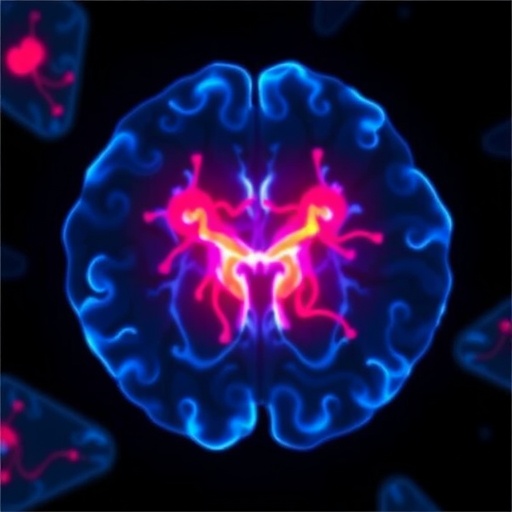In an unprecedented advance in the understanding of pediatric oncology, recent research has unveiled a pivotal connection between genetic variations in m^1A RNA modification core genes and the risk of developing neuroblastoma, a malignant childhood tumor. This breakthrough study was recently published in BMC Cancer and represents a significant leap forward in deciphering the molecular underpinnings of neuroblastoma susceptibility, offering new avenues for risk assessment and potential targeted therapies.
Neuroblastoma, a devastating cancer originating from neural crest elements of the sympathetic nervous system, has long been linked to genetic abnormalities, though the precise molecular mechanisms have remained elusive. The groundbreaking research targets the epitranscriptomic landscape, focusing on RNA N^1-methyladenosine (m^1A) modification—a chemical modification of RNA molecules that influences their stability and function. The core genes regulating m^1A modifications, specifically ALKBH1, TRMT6, TRMT61B, and TRMT10C, are now implicated as critical players in tumor development and progression.
The team conducted an extensive case-control study involving 898 children newly diagnosed with neuroblastoma and 1734 healthy controls across eight medical centers, illustrating the robustness of their sample size and the rigor in their methodology. Using the highly sensitive TaqMan genotyping approach, they examined 12 single-nucleotide polymorphisms (SNPs) within these m^1A modification genes, exploring their potential roles as genetic predisposition markers for neuroblastoma.
Advanced statistical models incorporating both univariable and multivariable logistic regressions revealed compelling associations between specific SNPs and increased neuroblastoma risk. For instance, variations in TRMT6, such as rs236170 GG, rs451571 CC, rs236188 AA, and rs236110 AA, showed a direct correlation with heightened susceptibility. Similarly, certain ALKBH1 variants, including rs6494 AA and rs176942 GG, were found to markedly increase the risk, while rs1048147 CC intriguingly displayed a protective effect against the disease.
These findings were not mere statistical artifacts but were further substantiated by expression quantitative trait locus (eQTL) analyses. This functional annotation demonstrated that rs6494 T to A substitution potentially diminishes ALKBH1 mRNA expression, indicating that disruptions in RNA methylation pathways can influence gene regulation and tumorigenesis. Other SNPs, such as rs451571 T to C, rs236188 G to A, and rs236110 C to A, appeared to modulate the expression balance of nearby genes RP5-967N21.11 and MCM8, both implicated in cellular processes relevant to cancer development.
This multilayered evidence underscores the mechanistic relevance of m^1A modification gene polymorphisms in shaping neuroblastoma susceptibility. It highlights a previously underexplored domain of epitranscriptomic regulation as a foundation for oncogenesis in pediatric patients. Such discoveries point towards a novel genetic landscape where RNA modifications not only influence normal cellular function but also contribute decisively to malignant transformation.
Beyond revealing risk associations, the study pioneers in mapping how these genetic variants may affect gene expression networks pivotal for tumor biology. Understanding these pathways enriches the potential for developing targeted molecular interventions, tailored screening programs for high-risk groups, and refining prognostic tools in clinical oncology.
The implications of these findings extend broadly across cancer research, emphasizing the importance of epitranscriptomic modifications in malignancy. It propels m^1A modification genes into the spotlight as potential biomarkers and therapeutic targets, promising advancements in precision medicine for neuroblastoma, one of the most common and challenging pediatric cancers.
In addition to its scientific impact, this research portends the eventual integration of epitranscriptomic profiling into routine clinical practices. Screening for these SNPs may become an integral part of genetic counseling, enabling early detection and personalized treatment regimens aimed at improving survival outcomes for affected children worldwide.
Moreover, this study opens a pathway for exploring gene-environment interactions that might further influence neuroblastoma development. Environmental factors, combined with these genetic predispositions, could elucidate why neuroblastoma incidence varies geographically and demographically, fostering a comprehensive approach to cancer prevention.
The collaborative nature of this multinational, multicenter study demonstrates the power of large-scale genetic investigations in unraveling complex disease networks. The convergence of cutting-edge genetic techniques, bioinformatics, and clinical data sets a new standard for future research exploring RNA modifications in cancer biology.
Future directions stemming from these insights involve functional validation through laboratory models to elucidate how specific SNPs affect RNA methylation dynamics and downstream cellular functions. Investigating therapeutic modulation of m^1A modification may unveil novel drug targets to mitigate tumor growth or sensitize tumors to existing treatments.
In summary, this seminal work elucidates the critical role of m^1A modification core genes and their genetic variants in modulating neuroblastoma risk. By bridging genetic variation with functional consequences on RNA methylation and gene expression, the research paints a comprehensive picture of neuroblastoma pathogenesis from a fresh epigenetic perspective.
Ultimately, this research heralds a transformative shift in understanding the genetic architecture of neuroblastoma, propelling epitranscriptomics to the forefront of cancer genetics and opening unparalleled opportunities to improve pediatric cancer care. As the field progresses, m^1A modification genes could become cornerstone biomarkers and therapeutic targets, revolutionizing outcomes for children afflicted by this formidable malignancy.
Subject of Research: Genetic variants in m^1A RNA modification core genes and their association with neuroblastoma susceptibility
Article Title: Association of genetic variants in m^1A modification core genes and neuroblastoma risk
Article References:
Jiang, S., Dong, S., Li, Y. et al. Association of genetic variants in m^1A modification core genes and neuroblastoma risk. BMC Cancer 25, 1606 (2025). https://doi.org/10.1186/s12885-025-14984-2
Image Credits: Scienmag.com




